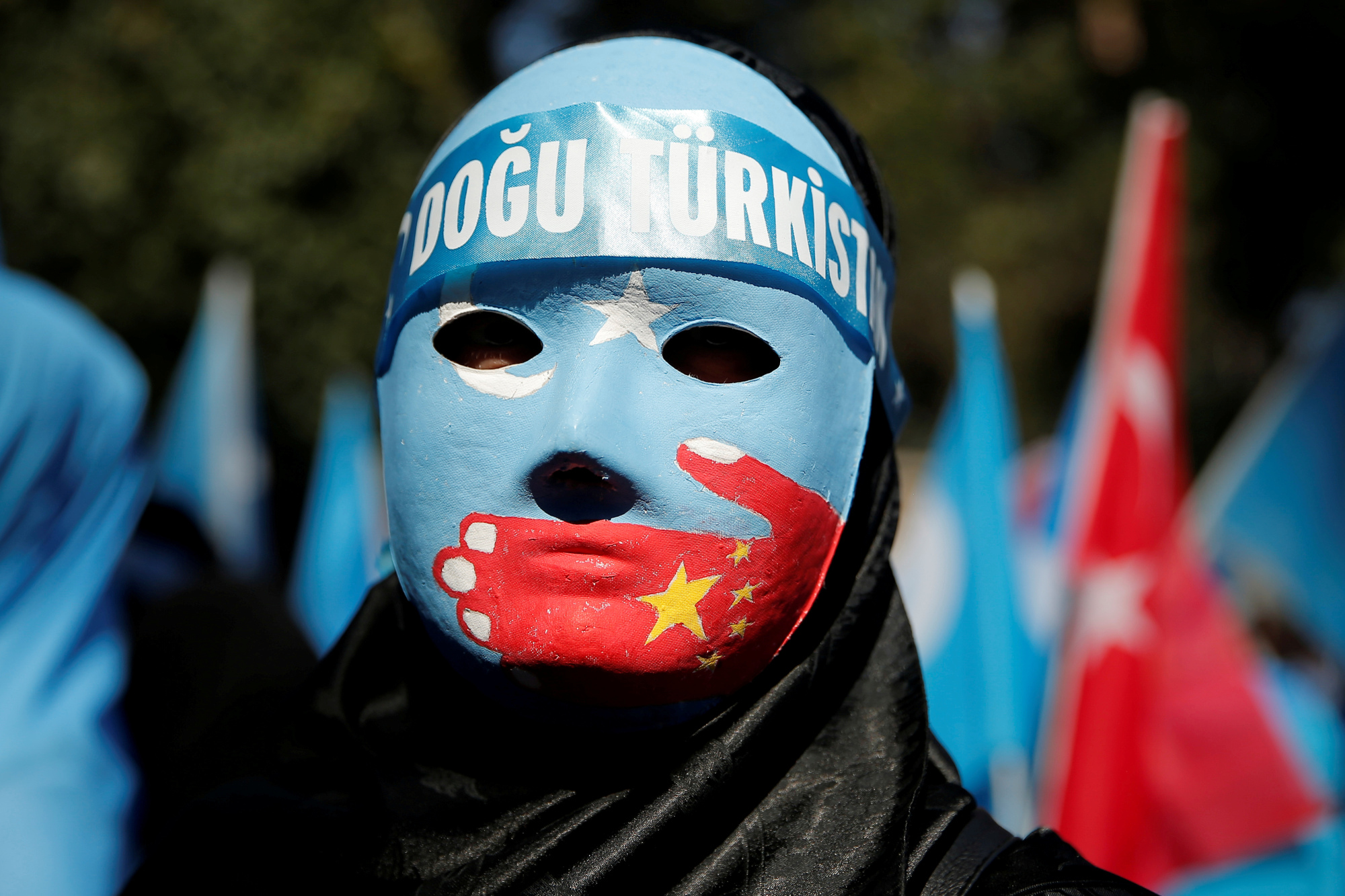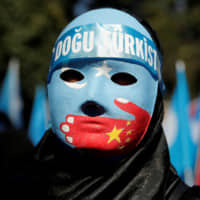Earlier this month, The New York Times obtained leaked documents from within China's ruling Communist Party concerning a "clampdown" of ethnic Uyghurs in the country's far west Xinjiang region. On Monday, the International Consortium of Investigative Journalists released more government documents, part of what is now being referred to as the China Cables.
The documents confirmed the fears of many in the Uyghur diaspora that their families had been targeted in a mass "re-education" project reportedly launched in an effort to quell what Beijing believed was the growing presence of Islamic extremism in China. The Chinese government's position is that the documents are fabricated.
There are an estimated 3,000 Uyghurs living in Japan today, many of whom have been a part of the international community here for years. Over the past few years, however, some in this community have been sliding into a state of paranoia and depression as they have found it harder and harder to make contact with family members back home.
I met with eight such Uyghurs at a small community center in Osaka earlier in the year. All of those who were present asked that their real names not be revealed in order to protect family members living in China.
"The Chinese authorities can easily identify us," "Samil" explains to me when asking for anonymity on behalf of the group. "And that will only bring more suffering to our families."
With the curtains in the room drawn, each of them begins to share how it feels to live in their new home while, according to the group, a "human rights crisis" plays out in their old one. Many of their concerns are similar, the main one being that contact with relatives living in Xinjiang has been completely severed. In cases where they have been able to regain contact, communication is so tense that those living in Japan are afraid to push for detailed explanations as to what is going on.
"Ilan," a Uyghur who has been living here for nearly 15 years, explains how she used the Chinese messaging app WeChat to keep in touch with her elderly parents and siblings. In 2017, about six months after she had returned from a trip to Xinjiang, she logged in to chat with her sister.
"I noticed my sister had deleted me (from her contacts)," she says. "It was very upsetting. So I called my Mom, and I said, 'Mom maybe one day you will also delete me?'
"My Mom told me it was just temporary, and to please be understanding. Then, around two months later, she also deleted me." Ilan has had no contact with her family for two years.
In January of this year, Ilan was at home with a friend when she noticed her phone suddenly came to life.
"Someone was controlling my WeChat account, moving through it," she recalls. "They were going through my contact list. I was so surprised, I kept asking my friend 'What's going on, what's going on?'"
Ilan and her friend looked on in disbelief as they watched someone access the phone remotely and parse through her chat records in real time. They pulled up photos, videos and documents written in Arabic. She then shows me the video that her friend took of the entire incident.
Ilan then immediately deleted her WeChat account and deactivated her phone.
The rest of those gathered at the community center in Osaka recount similar stories of strange interactions with their social media accounts and relatives. Samil mentions that in 2017 one of his family members asked for pictures of Samil and anyone in his family in Japan, as well as photos of his passport. Later, he was asked to send a picture of himself holding a newspaper in Japan to prove he was here.
In search of support
The Uyghurs gathered at the community center in Osaka have another thing in common: They all speak the language fluently. Many were educated here and have families, too.
None of them consider themselves to be particularly political. However, as things get worse in their homeland, they say they've had no choice but to stay informed. One Uyghur, "Omir," says he finds it difficult to concentrate on everyday things, while "Abdurehim" recounts how the stress has affected his driving — sailing through red lights and getting involved in two minor traffic accidents.
Ilan mentions that she has been constantly late for work. "It was never like this before," she says. "I can't concentrate on my work while thinking about my family."
"Rajid," who appears to take on the role of senpai (leader) of the group, speaks about how events in Xinjiang have affected his personality.
"There are two sides to me, I'm very strict and very kind," he says. "But now, the little things always get me down and I just feel like crying."
The stress affects the rest of the family, too. "Even when a parent dies we are unable to go back," Ilan says. "Our children are also suffering because we are very depressed. We are not happy and not leading normal lives. Every day is filled with sad news and we become gradually more depressed."
Though they all lead productive lives in Japan, they admit it's hard to open up to their Japanese friends and colleagues. "We don't really share what's going on in our lives at work, because it's difficult to explain," Samil says.
The group says they have also had to worry about "exposing themselves" in front of other Chinese people living in Japan. "The Chinese media portrays us (Uyghurs) in negative terms," Samil says. "The image they (Chinese in Japan) have of us is not good."
"I studied with Chinese students here in Japan and had friends at university who were Chinese," says "Askar." "But now, because of what's happening in Xinjiang to my family and to the Uyghurs, I feel it's making me racist toward the Chinese (here)."
The cost of taking action
Japan joined 21 other nations in calling on China to halt the alleged suppression of Uyghurs at a regular session of the United Nations Human Rights Council in July. China rebuked the move by claiming it was saving the Uyghurs population from what it says are "radical influences."
Some Uyghurs living in Japan have called on Tokyo to do more to help those back in their homeland and those who have relocated to this country. When asked about recent media reports concerning the China Cables on Tuesday, Foreign Minister Toshimitsu Motegi said, "We believe it is important that universal values in the international community such as freedom, respect for basic human rights and rule of law, are upheld in China."
Turmuhammed Hashim first came to Japan in 1994 to study at Kyushu University. He has been a supporter of Uyghur independence and human rights since 1997 after hearing that 30 pro-independence Uyghur activists were executed, an event that led to what is now known as the Ghulja incident.
"Since then, I have been speaking to the Japanese community about Uyghur issues," says Turmuhammed. He helped found the Japan Uyghur Association in 2008, but left the group to set up the Japan Uyghur Union, which has a stronger focus on independence for Xinjiang, which he refers to as East Turkestan.
Turmuhammed believes his activism has cost him his family. "My wife and daughter don't agree with my politics, they don't support me, so they went back to Urumqi in 2013," he says via telephone. As of 2017, he had completely lost contact with his daughter.
"I don't know where my daughter has gone or where she is," he says. "There is a big possibility that she was taken to a camp, because I'm her father and I'm involved in the independence movement in Japan."
Despite the personal cost, Turmuhammed remains undeterred.
"I have very good support from my many friends — from Hokkaido to Okinawa — and from my college," he says, referring to the people he works with.
Keeping faith
Back at the community center in Osaka, the members appear to be happy to share their stories with someone outside of their group.
Jeylan, one of the younger members present, last spoke with his parents after the birth of his first child.
"I called my mother on WeChat to show her my child," he says, "but it felt like there was someone standing off screen." In the same call, his mother told him "it's best not to make contact anymore."
Jeylan was diagnosed with depression in April, causing him to take time off work. His wife recently gave birth to the couple's second child, however, providing them both with a bit of relief from the constant negativity.
Samil says he tries to stay busy. "By concentrating on work and my family, it's a way of not thinking about what's going on in my hometown."
He adds that when it comes to coping with stress, his faith has become a source of strength.
"Religion has become more important," he says, noting that prayer — especially the du'a, a prayer of supplication or request — helps with "overcoming the stress and anxiety" he is currently dealing with.
Two hours and many stories later, the group chat winds to a close. The curtains are opened and light pours into the small community center. On the ride back to the train station, Samil talks a little more about his life in Japan.
"It's very hard at home," he says, referring to the stress and tension that comes from being cut off from his family. "But what can we do?"




















With your current subscription plan you can comment on stories. However, before writing your first comment, please create a display name in the Profile section of your subscriber account page.